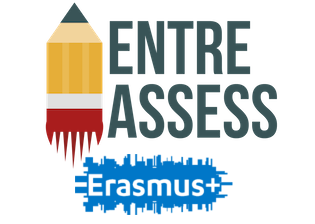If you are like me and are involved in education and have a desire to develop your learners’ Enterprising and Entrepreneurial (EE) skills then I’m sure that you have wrestled with the same issues I have? Where do I start? What are the key competences I should be developing? How do I go about assessing the progress of my students.
Don’t panic, I have one word for you…ENTREASSESS.
If you want to widen your knowledge of assessment methods for EE skills, then this is it!
As a nation, Wales is currently moving forward with curriculum reform and have identified four purposes of the curriculum. One of which being to develop ‘Enterprising and creative contributors’ who are ready to play a full part in life and work. As a senior lecturer in ‘Creative and Innovative Teaching and Learning’ within the University of Wales Trinity Saint David it is part of my role to respond to this new curriculum focus in education and aid the development of EE skills of my student teachers. As potential primary school teachers, it is an integral aspect of my students training that they are able to not only self-assess their own abilities with EE competences but also know how to effectively develop these with children in primary schools across Wales. As such, it is essential that they are proficient in utilising a variety of EE assessment strategies.
So how could EntreAssess aid your teaching?
One of the strengths of EntreAssess is the well-crafted ‘journey’ of EE skills development it facilitates. Once a brief amount of time is given to engaging with the EntreAssess model it becomes overtly clear that there isn’t one ‘right’ way of utilising this progression model.
The methods and tools for the assessment of EE skills outlined with EntreAssess can be effectively embedded in a wide variety of teaching approaches. For example, in my context, with large groups of adult learners, I conduct dedicated EE sessions utilising the proposed pathway of EntreAssess. Students begin by developing their understanding the importance and relevance of EE skills for both themselves as teachers and their primary learners. Once on-board, learners engage with the self-assessment tool to identify their own strengths and the EE competences they wish to develop further.
My student teachers then identify the most appropriate assessment methods to trial in their professional teaching experience out in schools. The variety and depth of the proposed tools and methods available via the EntreAssess website have enabled Students to target specific assessment methods for specific skill development. Students have found the ‘one pagers’ extremely helpful in aiding their justification for their choices.
‘Cherry picking’ elements from any progression model is sometimes problematic as potentially important or even essential elements of progression can be skipped or lost. However, with EntreAssess, educators can ‘dip’ into the wealth of resources, methods and tools available to meet a specific need already identified in their own context. Jump in a discover a new method of assessment aimed at creativity or explore a variety of tools that assess the ability to manage resources etc.
As a module coordinator, it is my duty to ensure that the structure of my students’ learning is engaging and effective enabling meaningful development. EntreAssess supports my planning for progression and continuity throughout a module. For example, the progression model is used in a ‘check point’ approach. Throughout the year students engage in a number of specific EE sessions that are spread across a number of months over the duration of the module. Each main element of the progression model is a ‘check point’. In between ‘check points’ students self-assess, reflect, engage in their own professional develop activities to further develop specific EE skills and utilise appropriate assessment strategies where appropriate. The progression model again aids this journey of development by being the much needed ‘map’ that directs, informs and supports the direction of travel for effective assessment of EE skills throughout pre-planned ‘check points’.
If you are involved in the delivery, training or development of EE skills, I highly recommend the EntreAssess progression model to aid your assessment strategies…let the journey begin!
Tom Cox, Senior lecturer in ‘Creative and Innovative Teaching and Learning’, University of Wales Trinity Saint David, Wales (UK)



